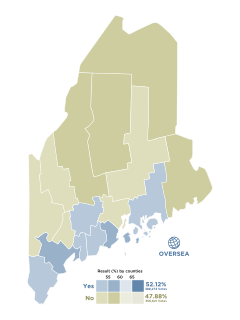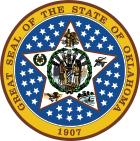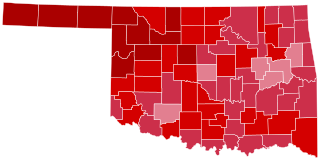State Questions
State Question #735
TEXT: This measure amends the Oklahoma Constitution. It adds Section 8D to Article 10. The measure takes effect January 1, 2009. It creates an exemption from personal property tax. The exemption would be for the full amount of taxes due on all household personal property. The exemption would apply to certain injured veterans. It would also apply to those veterans’ surviving spouses.
To qualify for the exemption an injured veteran would have to meet certain requirements. First, a branch of the Armed Forces or the Oklahoma National Guard would have to have honorably discharged the veteran from active service. Second, the veteran would have to be an Oklahoma resident. Third, the veteran would have to be the head of the household. Fourth, the veteran would have to be one hundred percent permanently disabled. Fifth, the United States Department of Veterans Affairs would have to certify the disability. Sixth, the disability must have occurred through military action or accident, or resulted from a disease contracted while in active service. The Legislature could pass laws to carry out the exemption. Such laws could not change the amount of the exemption.
FOR THE PROPOSAL - YES 1,153,831 85.00% AGAINST THE PROPOSAL - NO 203,644 15.00%
State Question #741
TEXT: This measure amends the Oklahoma Constitution. It would add a new Section 22A to Article 10. This section is related to exemptions from property taxes. It would require a person or business to file an application for an exemption. No exemption could be granted prior to filing an application. The Legislature may write laws to carry out the provisions of this section.
FOR THE PROPOSAL - YES 908,609 68.14% AGAINST THE PROPOSAL - NO 424,905 31.86%
State Question #742
TEXT: This measure adds a new section to the State Constitution. It adds Section 36 to Article 2. It gives all people of this state the right to hunt, trap, fish and take game and fish. Such activities would be subject to reasonable regulation. It allows the Wildlife Conservation Commission to approve methods and procedures for hunting, trapping, fishing and taking of game and fish. It allows for taking game and fish by traditional means. It makes hunting, fishing, and trapping the preferred means to manage certain game and fish. The new law will not affect existing laws relating to property rights.
FOR THE PROPOSAL - YES 1,082,341 80.05% AGAINST THE PROPOSAL - NO 269,787 19.95%
State Question #743
TEXT: This measure amends Section 3 of Article 28 of the Constitution. It requires a customer to be twenty-one and physically present to purchase wine at a winery, festival or trade show. The measure changes the law to allow certain winemakers to sell directly to retail package stores and restaurants in Oklahoma. The change applies to winemakers who produce up to ten thousand gallons of wine a year. It applies to winemakers in state and out of state. Those winemakers may not also use a licensed wholesale distributor. They must sell their wine to every retail package store and restaurant in Oklahoma that wants to buy the wine. The sales must be on the same price basis. The sales must be without discrimination. Those winemakers must use their own leased or owned vehicles to distribute their wine. They may not use common or private carriers. If any part of this measure is found to be unconstitutional, no winemaker could sell wine directly to retail package stores or restaurants in Oklahoma.
FOR THE PROPOSAL - YES 1,064,972 78.94% AGAINST THE PROPOSAL - NO 284,141 21.06%

The Seventeenth Amendment to the United States Constitution established the direct election of United States senators in each state. The amendment supersedes Article I, §3, Clauses 1 and 2 of the Constitution, under which senators were elected by state legislatures. It also alters the procedure for filling vacancies in the Senate, allowing for state legislatures to permit their governors to make temporary appointments until a special election can be held.

The Bipartisan Campaign Reform Act of 2002 is a United States federal law that amended the Federal Election Campaign Act of 1971, which regulates the financing of political campaigns. Its chief sponsors were senators Russ Feingold (D-WI) and John McCain (R-AZ). The law became effective on 6 November 2002, and the new legal limits became effective on January 1, 2003.

The Legislature of the State of Oklahoma is the state legislative branch of the U.S. state of Oklahoma. The Oklahoma House of Representatives and Oklahoma Senate are the two houses that make up the bicameral state legislature. There are 101 state representatives, each serving a two-year term, and 48 state senators, who serve four-year terms that are staggered so only half of the Oklahoma Senate districts are eligible in each election cycle. Legislators are elected directly by the people from single member districts of equal population. The Oklahoma Legislature meets annually in the Oklahoma State Capitol in Oklahoma City.

The Oklahoma Senate is the upper house of the two houses of the Legislature of Oklahoma, the other being the Oklahoma House of Representatives. The total number of senators is set at 48 by the Oklahoma Constitution.

The Oklahoma state elections were held on November 7, 2006. The primary election was held on July 25. The runoff primary election was held August 22. The 2006 elections marked the first time in 80 years that the Republican Party gained a majority of seats in the Oklahoma House of Representatives.

Jason Murphey is a former Republican State Representative in the US state of Oklahoma. He represented District 31 in the Oklahoma House of Representatives; the district comprises portions of Logan and Oklahoma counties and includes the cities of Edmond and Guthrie. Murphey currently serves as the chair of the Government Modernization Committee and was named to this position prior to the 2009 legislative session. As chair, Murphy was the House author of Senator Glen Coffee's attempt to centralize the state's information technology systems and the Oklahoma Government 2.0 initiative, which resulted in the creation of data.ok.gov.

Elections in Oregon are all held using a Vote by Mail (VBM) system. This means that all registered voters receive their ballots via postal delivery and can vote from their homes. A state Voters’ Pamphlet is mailed to every household in Oregon about three weeks before each statewide election. It includes information about each measure and candidate in the upcoming election.

On November 4, 2008, the U.S. state of Oregon held statewide general elections for three statewide offices, both houses of the Oregon Legislative Assembly, and twelve state ballot measures. The primary elections were held on May 20, 2008. Both elections also included national races for President of the US, US Senator, and US House Representatives. Numerous local jurisdictions — cities, counties, and regional government entities — held elections for various local offices and ballot measures on these days as well.

The 2000 California Republican presidential primary was held on March 7, 2000. Governor George W. Bush of Texas won easily over Senator John McCain of Arizona and former Ambassador Alan Keyes.

The 2008 United States presidential election in Oklahoma took place on November 4, 2008, and was part of the 2008 United States presidential election. Voters chose seven representatives, or electors to the Electoral College, who voted for president and vice president.

General elections were held in Oregon on Tuesday, November 2, 2010. Primary elections took place on May 18, 2010.

On November 6, 2012, the U.S. state of Oregon held statewide general elections for four statewide offices, both houses of the Oregon Legislative Assembly, and several state ballot measures.

Nancy K. Barto is an American politician and a Republican member of the Arizona State Senate since 2021. She previously served in the Arizona House of Representatives from 2019 to 2021 and the Arizona Senate representing District 15 from 2013 to 2019. Barto served consecutively in the Arizona State Legislature from January 2007 until January 10, 2011 in the Arizona House of Representatives District 7 seat, then in the Arizona Senate in the District 7 seat from January 10, 2011 until January 14, 2013.

Maine Question 5, formally An Act to Establish Ranked-Choice Voting, is a citizen-initiated referendum question that qualified for the Maine November 8, 2016 statewide ballot. It was approved by a vote of 52% in favor, 48% opposed. It sought to change how most Maine elections will be conducted from a plurality voting system to a ranked-choice voting system. It appeared on the ballot along with elections for President of the United States, Maine's two U.S. House seats, the legislature, five other ballot questions, and various local elections. The referendum was successful, making Maine the first state to use ranked choice voting for its federal elections.

Elections were held in Illinois on Tuesday, November 7, 1978.

Oklahoma Question 802, the Oklahoma Medicaid Expansion Initiative, was a 2020 ballot measure on the June 30 ballot to expand Medicaid in the state of Oklahoma. It passed narrowly, over the objections of many prominent state elected officials, such as Oklahoma's governor Kevin Stitt. Medicaid expansion went into effect on July 1, 2021.

On November 2, 2010, Illinois voters approved the Illinois Governor Recall Amendment, a legislatively referred constitutional amendment to the Constitution of Illinois. The amendment changed the state constitution to allow recall elections of Illinois governors.

Oklahoma Question 788, the Oklahoma Medical Marijuana Legalization Initiative, was a 2018 ballot measure on the June 26 ballot to legalize medical marijuana in the state of Oklahoma. It passed with over 56% "yes" votes.

A general election will be held in the state of Oklahoma on Tuesday, November 8, 2022. The primary election is scheduled for Tuesday, June 28, 2022. Runoff primary elections, if necessary, will be held on Tuesday, August 23, 2022. The candidate filing deadline was April 15, 2022.

The 2021 New York state elections were held on November 2, 2021. In addition to the standard local elections, many seats for the New York Supreme Court were to be filled in addition to ballot proposals regarding changing state electoral rules and court limits.
















